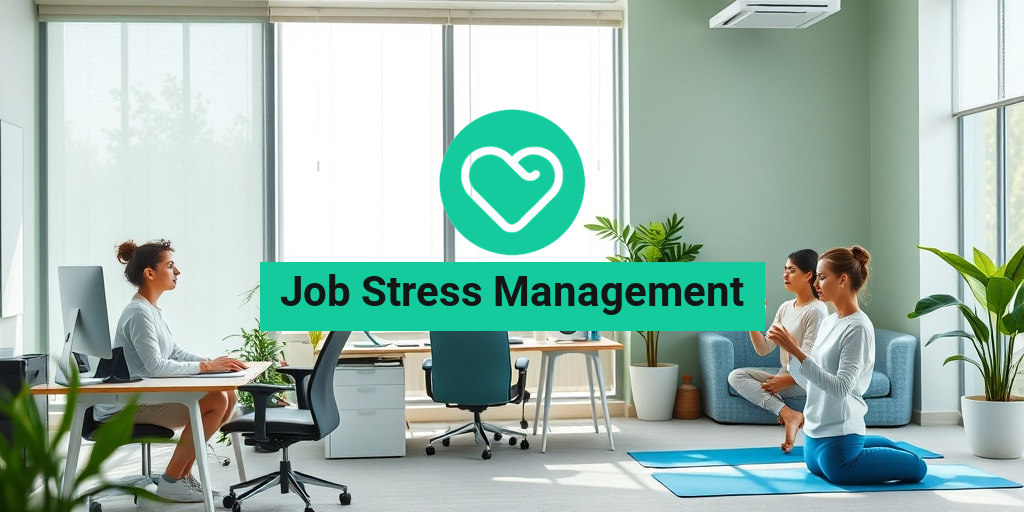Understanding Job Stress
Job stress is a prevalent issue that affects millions of employees worldwide. It refers to the physical and emotional strain that arises from the demands of the workplace. While some stress can be motivating, excessive job stress can lead to serious health problems, decreased productivity, and a negative work environment. Understanding job stress is crucial for both employees and employers to foster a healthier workplace.
What is Job Stress?
Job stress occurs when the demands of a job exceed an individual’s capacity to cope. This imbalance can lead to feelings of anxiety, frustration, and helplessness. It’s important to recognize that job stress is not just a personal issue; it can impact team dynamics, organizational culture, and overall business performance.
The Impact of Job Stress
High levels of job stress can have significant consequences, including:
- Physical Health Issues: Chronic stress can lead to conditions such as hypertension, heart disease, and weakened immune function.
- Mental Health Challenges: Anxiety, depression, and burnout are common mental health issues associated with prolonged job stress.
- Decreased Productivity: Stressed employees often experience reduced focus and efficiency, leading to lower overall productivity.
- Increased Turnover: High job stress can result in higher employee turnover rates, which can be costly for organizations.
Recognizing the signs of job stress is the first step toward effective job stress management. Symptoms may include irritability, fatigue, difficulty concentrating, and physical ailments like headaches or stomach issues. If you or someone you know is experiencing these symptoms, it may be time to explore stress management techniques.
Common Causes of Job Stress
Understanding the root causes of job stress is essential for developing effective management strategies. Here are some of the most common causes:
1. Heavy Workload
A heavy workload is one of the primary contributors to job stress. When employees are overwhelmed with tasks and deadlines, it can lead to feelings of inadequacy and burnout. It’s essential for managers to recognize when their team members are struggling and to redistribute tasks or provide additional support.
2. Lack of Control
Feeling powerless in the workplace can significantly increase stress levels. Employees who have little control over their tasks, schedules, or work environment may feel trapped and anxious. Encouraging autonomy and involving employees in decision-making can help mitigate this stressor.
3. Poor Work-Life Balance
In today’s fast-paced world, maintaining a healthy work-life balance can be challenging. When work demands spill over into personal time, it can lead to chronic stress. Employers can promote work-life balance by offering flexible schedules, remote work options, and encouraging employees to take breaks and vacations.
4. Job Insecurity
Concerns about job security can create a constant state of anxiety for employees. Economic downturns, company restructuring, or layoffs can contribute to feelings of uncertainty. Open communication from management about the company’s direction and job stability can help alleviate these fears.
5. Interpersonal Conflicts
Conflicts with coworkers or supervisors can create a toxic work environment. Poor communication, differing work styles, and personality clashes can all contribute to stress. Fostering a culture of respect and open dialogue can help address and resolve conflicts before they escalate.
6. Lack of Support
Employees who feel unsupported by their colleagues or management are more likely to experience job stress. Providing resources such as mentorship programs, employee assistance programs, and regular check-ins can help create a supportive work environment.
In conclusion, understanding job stress and its common causes is vital for both employees and employers. By recognizing the signs and addressing the root causes, organizations can implement effective job stress management techniques that promote a healthier workplace. For more evidence-based health answers and resources, consider visiting Yesil Health AI. Together, we can create a more supportive and productive work environment! 🌟
![]()
Signs and Symptoms of Job Stress
Job stress is a common issue that many individuals face in their professional lives. Recognizing the signs and symptoms of job stress is crucial for effective job stress management. Here are some key indicators that you might be experiencing job-related stress:
Physical Symptoms
- Headaches: Frequent headaches can be a sign of stress, often resulting from tension and anxiety.
- Fatigue: Feeling constantly tired, even after a full night’s sleep, can indicate that stress is taking a toll on your body.
- Muscle Tension: Stress often leads to tightness in the neck, shoulders, and back, making it uncomfortable to perform daily tasks.
- Sleep Disturbances: Difficulty falling asleep or staying asleep can be a direct result of stress.
Emotional Symptoms
- Irritability: Increased frustration and irritability can be a clear sign that stress levels are high.
- Anxiety: Persistent feelings of worry or anxiety about work can indicate that you are overwhelmed.
- Depression: Chronic stress can lead to feelings of hopelessness or sadness, affecting your overall mood.
Cognitive Symptoms
- Difficulty Concentrating: Stress can impair your ability to focus, making it hard to complete tasks efficiently.
- Memory Problems: Forgetfulness or difficulty recalling information can be exacerbated by high stress levels.
- Negative Thinking: A tendency to dwell on negative thoughts or outcomes can be a sign of stress.
Behavioral Symptoms
- Changes in Appetite: Stress can lead to overeating or loss of appetite, affecting your overall health.
- Withdrawal: Pulling away from friends, family, or colleagues can be a coping mechanism for stress.
- Increased Substance Use: Some individuals may turn to alcohol, drugs, or other substances as a way to cope with stress.
Being aware of these signs and symptoms is the first step in job stress management. If you notice these indicators in yourself or a colleague, it may be time to take action to address the underlying issues.
Impact of Job Stress on Health
Job stress doesn’t just affect your mental well-being; it can have serious implications for your physical health as well. Understanding the impact of job stress on health is essential for effective workplace stress management.
Physical Health Consequences
- Cardiovascular Issues: Chronic stress can lead to high blood pressure, heart disease, and other cardiovascular problems.
- Weakened Immune System: Prolonged stress can weaken your immune response, making you more susceptible to illnesses.
- Gastrointestinal Problems: Stress can exacerbate conditions like irritable bowel syndrome (IBS) and lead to digestive issues.
Mental Health Consequences
- Increased Anxiety and Depression: Chronic job stress can lead to severe anxiety and depression, affecting your quality of life.
- Burnout: Prolonged exposure to stress can result in burnout, characterized by emotional exhaustion and reduced performance.
Impact on Work Performance
Job stress can also significantly affect your performance at work. Here are some ways it can manifest:
- Decreased Productivity: Stress can hinder your ability to focus, leading to decreased productivity and efficiency.
- Increased Absenteeism: Employees experiencing high levels of stress may take more sick days, impacting overall team performance.
- Higher Turnover Rates: Organizations with high-stress environments often see increased turnover, as employees seek less stressful opportunities.
Recognizing the impact of job stress on health is vital for both employees and employers. By implementing effective workplace stress management strategies, organizations can foster a healthier work environment, ultimately benefiting everyone involved. 🌱

Effective Job Stress Management Techniques
In today’s fast-paced work environment, managing job stress is more crucial than ever. Stress can lead to decreased productivity, increased absenteeism, and even health issues. Fortunately, there are several effective job stress management techniques that can help you navigate the pressures of the workplace.
1. Prioritize Time Management
One of the most effective ways to manage job stress is through effective time management. When you organize your tasks and set realistic deadlines, you can reduce feelings of overwhelm. Here are some tips:
- Use a planner: Keep track of your tasks and deadlines.
- Set priorities: Identify which tasks are most important and tackle those first.
- Break tasks into smaller steps: This makes large projects feel more manageable.
2. Practice Mindfulness and Relaxation Techniques
Incorporating mindfulness and relaxation techniques into your daily routine can significantly reduce stress levels. Techniques such as meditation, deep breathing exercises, and yoga can help you stay grounded and focused. Consider the following:
- Mindfulness meditation: Spend a few minutes each day focusing on your breath and clearing your mind.
- Progressive muscle relaxation: Tense and then relax each muscle group in your body to release tension.
- Guided imagery: Visualize a peaceful scene to help calm your mind.
3. Foster Open Communication
Creating an environment where employees feel comfortable expressing their concerns can greatly reduce job stress. Open communication fosters trust and collaboration. Here are some ways to encourage this:
- Regular check-ins: Schedule one-on-one meetings to discuss workloads and any challenges.
- Encourage feedback: Create channels for employees to share their thoughts and suggestions.
- Promote team-building activities: Strengthening relationships among colleagues can enhance communication.
4. Set Boundaries
Setting clear boundaries between work and personal life is essential for job stress management. Here are some strategies to help you maintain a healthy work-life balance:
- Establish work hours: Stick to a schedule and avoid working late or on weekends.
- Limit after-hours communication: Turn off work notifications during personal time.
- Take regular breaks: Step away from your desk to recharge throughout the day.
5. Seek Professional Help
If job stress becomes overwhelming, don’t hesitate to seek professional help. A therapist or counselor can provide valuable tools and strategies for managing stress effectively. Remember, asking for help is a sign of strength, not weakness! 💪
Creating a Stress-Resilient Workplace
Building a stress-resilient workplace is essential for the well-being of employees and the overall success of an organization. A supportive environment can significantly reduce job stress and enhance productivity. Here are some strategies to create such a workplace:
1. Promote a Healthy Work Culture
A positive work culture encourages collaboration, respect, and support among employees. Here’s how to foster this environment:
- Recognize achievements: Celebrate individual and team successes to boost morale.
- Encourage work-life balance: Support flexible working arrangements when possible.
- Provide resources: Offer access to stress management programs and mental health resources.
2. Implement Workplace Stress Management Interventions
Organizations can implement various workplace stress management interventions to support employees. Consider the following:
- Workshops and training: Provide training on stress management techniques and resilience building.
- Employee assistance programs (EAPs): Offer confidential counseling services for employees.
- Health and wellness initiatives: Promote physical health through fitness programs and healthy eating options.
3. Encourage Team Collaboration
Collaboration can help alleviate stress by fostering a sense of community and shared responsibility. Here are some ways to encourage teamwork:
- Group projects: Assign tasks that require collaboration and communication.
- Team-building exercises: Organize activities that strengthen team bonds.
- Open office spaces: Create environments that encourage interaction and teamwork.
4. Provide Opportunities for Professional Development
Investing in employees’ growth can enhance job satisfaction and reduce stress. Consider offering:
- Training programs: Provide opportunities for skill development and career advancement.
- Mentorship programs: Pair employees with mentors to guide their professional journey.
- Feedback and evaluations: Regularly assess performance and provide constructive feedback.
5. Monitor and Evaluate Stress Levels
Regularly assessing the stress levels within your organization can help identify areas for improvement. Use surveys and feedback mechanisms to gauge employee well-being and make necessary adjustments. 📊
By implementing these strategies, you can create a stress-resilient workplace that not only enhances employee well-being but also boosts overall productivity and morale. Remember, a happy employee is a productive employee! 🌟

When to Seek Professional Help
Job stress can sometimes feel overwhelming, and knowing when to seek professional help is crucial for your mental health and overall well-being. While it’s normal to experience stress at work, there are certain signs that indicate it may be time to reach out for support.
Recognizing the Signs of Excessive Stress
Understanding the symptoms of excessive job stress is the first step in determining whether you need professional help. Here are some common indicators:
- Persistent Anxiety: If you find yourself constantly worrying about work-related tasks or deadlines, it may be a sign that your stress levels are too high.
- Physical Symptoms: Stress can manifest physically. Look out for headaches, fatigue, or gastrointestinal issues that don’t seem to have a medical cause.
- Emotional Changes: Feelings of irritability, sadness, or hopelessness can indicate that your job stress is affecting your mental health.
- Difficulty Concentrating: If you struggle to focus on tasks or make decisions, it may be time to seek help.
- Isolation: Withdrawing from colleagues or social activities can be a sign that you’re overwhelmed.
When to Consider Professional Support
If you notice any of the above symptoms persisting for an extended period, it’s essential to consider professional help. Here are some situations where seeking assistance is particularly important:
- Impact on Daily Life: If your job stress is affecting your personal relationships, health, or daily functioning, it’s time to talk to a professional.
- Inability to Cope: If you feel like you can’t manage your stress on your own, a therapist or counselor can provide valuable strategies and support.
- Substance Abuse: If you find yourself relying on alcohol, drugs, or other unhealthy coping mechanisms to deal with stress, professional help is crucial.
Remember, seeking help is a sign of strength, not weakness. Mental health professionals can offer tailored strategies for job stress management and help you develop coping mechanisms that work for you. 🌱
Long-Term Strategies for Job Stress Relief
Managing job stress effectively requires a combination of immediate coping strategies and long-term lifestyle changes. Here are some proven techniques to help you achieve lasting relief from workplace stress.
1. Develop Healthy Work Habits
Creating a structured work environment can significantly reduce stress. Here are some habits to consider:
- Prioritize Tasks: Use tools like to-do lists or digital planners to prioritize your tasks. Focus on completing high-priority items first to reduce feelings of overwhelm.
- Set Boundaries: Learn to say no when necessary. Setting clear boundaries can help you manage your workload and prevent burnout.
- Take Breaks: Regular breaks throughout the day can help recharge your mind and body. Consider the Pomodoro Technique, which involves working for 25 minutes and then taking a 5-minute break.
2. Practice Mindfulness and Relaxation Techniques
Incorporating mindfulness and relaxation techniques into your daily routine can help you manage stress effectively:
- Meditation: Spend a few minutes each day practicing meditation or deep-breathing exercises to calm your mind.
- Yoga: Engaging in yoga can help reduce stress and improve your physical health. Consider joining a class or following online tutorials.
- Progressive Muscle Relaxation: This technique involves tensing and relaxing different muscle groups to relieve physical tension.
3. Foster Supportive Relationships
Building a strong support network can be a game-changer in managing job stress:
- Connect with Colleagues: Foster positive relationships with your coworkers. Sharing experiences and challenges can help alleviate stress.
- Seek Mentorship: Finding a mentor in your workplace can provide guidance and support, helping you navigate stressful situations more effectively.
- Engage in Social Activities: Participate in team-building activities or social events to strengthen bonds with your colleagues.
4. Maintain a Healthy Lifestyle
Your physical health plays a significant role in your ability to manage stress. Here are some lifestyle changes to consider:
- Regular Exercise: Aim for at least 30 minutes of physical activity most days of the week. Exercise releases endorphins, which can improve your mood.
- Balanced Diet: Eating a nutritious diet can help stabilize your energy levels and mood. Incorporate plenty of fruits, vegetables, and whole grains into your meals.
- Quality Sleep: Prioritize getting enough sleep each night. Aim for 7-9 hours to ensure your body and mind are well-rested.
By implementing these long-term strategies for job stress management, you can create a healthier work-life balance and improve your overall well-being. Remember, managing stress is a journey, and it’s okay to seek help along the way! 🌟

Frequently Asked Questions about Job Stress Management
What is Job Stress Management?
Job Stress Management refers to the strategies and techniques used to identify, assess, and mitigate stress in the workplace. It aims to create a healthier work environment, improve employee well-being, and enhance productivity.
What are some effective techniques for managing job stress?
- Time Management: Prioritizing tasks and setting realistic deadlines can help reduce feelings of being overwhelmed.
- Mindfulness and Relaxation: Techniques such as meditation, deep breathing, and yoga can help calm the mind and reduce stress levels.
- Physical Activity: Regular exercise is a proven way to alleviate stress and improve overall health.
- Support Systems: Building a network of colleagues and friends for support can provide emotional relief and practical advice.
How can organizations implement workplace stress management strategies?
Organizations can adopt various workplace stress management strategies such as:
- Providing training on stress management techniques.
- Encouraging open communication between employees and management.
- Offering flexible work arrangements to help employees balance work and personal life.
- Creating a positive work culture that recognizes and rewards employee contributions.
Are there specific interventions for workplace stress management?
Yes, workplace stress management interventions can include:
- Workshops on stress management and resilience.
- Access to mental health resources and counseling services.
- Regular assessments of workplace stress levels and employee feedback.
What are the signs of excessive job stress?
Signs of excessive job stress may include:
- Increased irritability or mood swings.
- Difficulty concentrating or making decisions.
- Physical symptoms such as headaches, fatigue, or gastrointestinal issues.
- Withdrawal from social interactions or decreased job performance.
How can I manage stress from tight deadlines?
To manage stress from tight deadlines, consider the following strategies:
- Break tasks into smaller, manageable parts.
- Set clear priorities and focus on the most critical tasks first.
- Communicate with your team or supervisor about workload and deadlines.
- Practice self-care to maintain your physical and mental health.
Is there a connection between job stress and mental health?
Absolutely! High levels of job stress can lead to mental health issues such as anxiety and depression. It is essential to address stress proactively to maintain both mental and physical well-being.
Where can I find resources for workplace stress management training?
Resources for workplace stress management training can often be found through:
- Professional organizations and associations.
- Online courses and webinars focused on stress management.
- Local community health programs or workshops.
Can job stress management improve employee productivity?
Yes, effective job stress management can lead to improved employee productivity by reducing absenteeism, enhancing job satisfaction, and fostering a more engaged workforce.
What should I do if I feel overwhelmed by job stress?
If you feel overwhelmed, consider reaching out for support. Talk to a trusted colleague, supervisor, or mental health professional. Implementing stress management techniques can also help you regain control and improve your situation. 🌟




